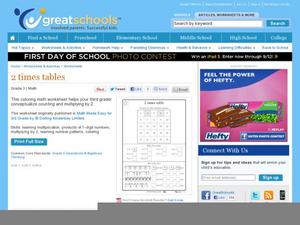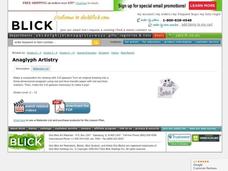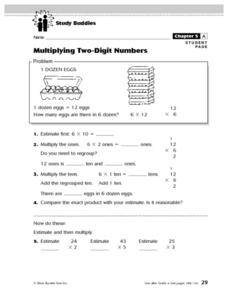Curated OER
Count Money: Nickels and Dimes
in this money learning exercise, students count sets of coins that include nickels and dimes, add them up and write the total on a line beneath each group.
Curated OER
Graph Groups (Two Colors)
In this graphing worksheet, students count the colors of the shapes given to them, and put them into a graph representing a bar graph. Students complete 5 problems.
Curated OER
Graph Groups (One Color)
For this graphing worksheet, students solve 5 problems in which the colored shapes in each set are counted. Students then fill out a bar graph to show how many of each color are in the sets.
Curated OER
Multiplication as Repeated Addition
For beginners, present multiplication as repeated addition to give them a familiar context. They examine grouped sets of objects and add up the groups to get a total. Then, learners translate the addition sets to a basic multiplication...
Illustrative Mathematics
Gifts from Grandma, Variation 3
There are three money word problems in this activity, each one is set in the same context. The first asks what was the total amount grandma spent, the second how many grandchildren grandma has, and the third asks how much grandma spent...
Curated OER
Comparing Areas
Before your scholars know how to multiply side lengths to find an area, give them some practice in simply counting units. They examine shapes that have already been segmented into units, counting them to get the area. There are three...
Curated OER
Interpreting Circle Graphs
What does this pie chart mean? Once scholars can analyze a circle graph on a basic level (i.e. "Most people prefer cats"), it's time to delve deeper into it. They examine two graphs here, and are given the total number of participants...
DK Publishing
Learning 10 - Write the Number
Already covered numbers 0-9? It's time to focus on 10 with this set of exercises. First, youngsters trace the number 10 three times and try printing it a couple of times on their own. Next, they count five sets of bottles and write the...
DK Publishing
Real-life Problems, Working with Fractions
Test your fifth graders' math skills with five word problems involving fractions. After studying two examples at the top of the page, pupils multiply fractions by whole numbers to solve each word problem. The worksheet provides two...
Curated OER
Sorting Sets
Here is a simple sorting activity which is appropriate for pre-k and kindergarten learners. Pupils sort each of four items into the correct group, then count the totals and write the numbers in the boxes provided. Along with being a good...
Balanced Assessment
Red Dots, Blue Dots
Count the connections between dots. Young mathematicians come up with a method to determine the number of connections between pairs of dots. The assessment leads the class to determine the connections they can make when groups are...
Curated OER
Drops on a Penny
Young scientists explore the concept of surface tension at is applies to water. In this activity, learners use a dropper to place drops of water on a penny. Each group guesses how many drops a heads-up penny will hold, then conducts the...
Curated OER
Linear Programming
In this linear programming worksheet, students solve and complete 6 different word problems related to programming. First, they define the variables in each problem and write a system of inequalities. Then, students graph the...
DK Publishing
2 Times Tables
Third graders count, multiply, and color their way to success. Not only do they practice multiplying two by various numbers, they color in a table to fully understand the two-times table, as well as counting sets of two ears on different...
EngageNY
Real-World Positive and Negative Numbers and Zero
Class members investigate how positive and negative numbers are useful in the real world. Individuals first read a short passage and identify terms indicating positive and negative numbers. They consider situations involving positive...
Illustrative Mathematics
Molly's Run
A simple lesson with a lot of support behind it. Your learners will find out how long it takes Molly to run a mile by choosing their solution method. The activity can be used as a lesson or as an independent assignment. Preface with...
Illustrative Mathematics
Making Hot Cocoa, Variation 1
Dividing with fractions can be a confusing task to some, but the activity illustrates how to make groups out of the problem and look at it visually. Use this problem with the lesson in the Additional Materials section to practice this...
Illustrative Mathematics
Traffic Jam
Help your learners understand dividing with fractions by using these methods to solve. Chose from two different number lines or linker cubes. This practices "how many groups?" style division problems which help them comprehend why...
National External Diploma Program Council
Finding an Average
Young hopefuls can practice finding the average of a group of numbers represented in tables and word problems.
Illustrative Mathematics
Video Game Credits
Help your learners understand how to divide fractions with this visual activity. They first answer a simple inequality before dividing the fractions. Two solution choices are given to help your mathematicians understand how to solve "how...
Curated OER
Study Buddies: Multiplying Two-Digit Numbers
In this math homework worksheet, students will solve a 2 digit multiplication problem with parental support. Students will follow a step-by-step process and "Coach's Notes" are provided for the parent helper.
Curated OER
Mixed Tables
How many pennies does each person get? There are four visual division problems for young mathematicians to solve, and they divide 12 pennies among a set of people for each. They draw the coins above each recipient and then write the...
DK Publishing
Taking 2 Away
Go deep and dive under the sea with subtraction! Kindergartners practice taking two away from different groups of fish and writing in the answer. Have them color the fish for extra fun after they finish their math work.
Illustrative Mathematics
Seeing is Believing
How many visual models can be used to show multiplication? Three basic kinds of models can be used to represent and explain the equation 4 x (9 + 2). The commentary section provides description and graphics to explain the set...

























